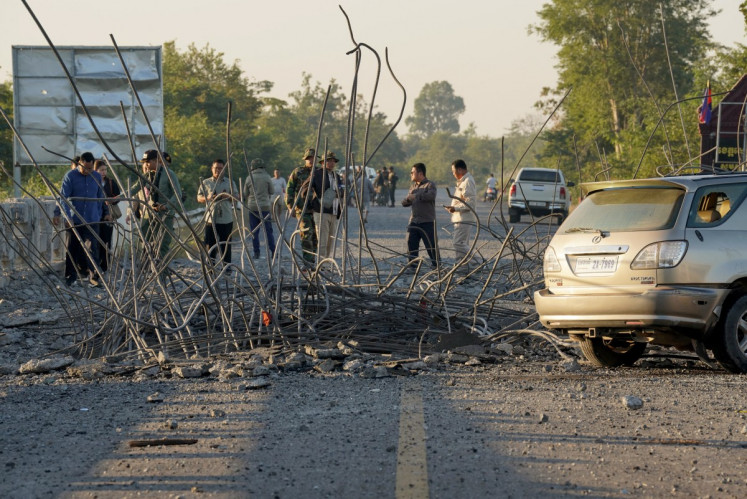Popular Reads
Top Results
Can't find what you're looking for?
View all search resultsPopular Reads
Top Results
Can't find what you're looking for?
View all search resultsJokowi orders action against racial abuse
The aggrieved: Escorted by military personnel and police officers, Papuans demonstrate in front of the Presidential Palace in Central Jakarta on Thursday
Change text size
Gift Premium Articles
to Anyone
T
he aggrieved: Escorted by military personnel and police officers, Papuans demonstrate in front of the Presidential Palace in Central Jakarta on Thursday. Protesters called on the government to take seriously cases of physical and racial abuse against Papuan students by security personnel in Surabaya, East Java, on Saturday.(JP/Seto Wardhana)
President Joko “Jokowi” Widodo has spoken out against the racial abuse suffered by Papuan students while protests continued in the provinces amid a government-imposed internet blackout.
“I have followed the developments in Papua and alhamdulillah [praise God], the situation has returned to normal,” he said at a press conference at Bogor Palace on Thursday.
“I have also ordered the National Police chief to take stern, legal action against acts of racial and ethnic discrimination.”
Jokowi added that he would invite public, cultural and religious figures from Papua and West Papua to the palace to talk about “accelerating prosperity in the land of Papua”.
Jokowi’s statement came after four consecutive days of protests in Papua and West Papua, which were triggered by physical and verbal attacks aimed at Papuan students in East Java.
In Surabaya, members of mass organizations as well as several security personnel were reportedly heard calling Papuan university students “monkeys”, “pigs” and “dogs” on Friday, while police also stormed the city’s Papuan student dormitory with tear gas on Saturday.
On Monday, Jokowi called on Indonesians to “forgive each other” while declining to comment on the racial abuse, drawing criticism from Papuans and rights groups.
On Thursday, thousands rallied in front of the Regional Legislative Council (DPRD) building in Nabire regency. Resident Eko Purwanto said the rally began at around 7 a.m. local time and was initially peaceful. “But when the crowd reached the DPRD building, they started to burn tires in front of it,” Eko told The Jakarta Post.
Nabire Police chief Sr. Adj. Comr. Sonny M. Nugroho said the clashes ended after religious figures stepped in to help police diffuse the situation. “The situation is now calm again after the demonstration and there were no fatalities,” Sonny said on Thursday afternoon as quoted by Antara news agency.
The protests have spread nationwide, with hundreds of Papuans and activists staging antiracism rallies in Central Jakarta and Bandung, West Java. They held banners that read “Papuans are not monkeys”.
Hours after the government announced they were deploying nearly 1,300 military personnel to the restive provinces, the Communications and Information Ministry announced it would block cellular services in Papua and West Papua in order to “accelerate the process of restoring security and order”.
The ministry had only slowed down internet access in Jayapura, Manokwari and Sorong.
Human rights groups have decried the policy, calling on the government to restore internet access to the region. The Southeast Asia Freedom of Expression Network (SAFEnet) started a petition on change.org urging the government to restore internet access in the provinces.
SAFEnet executive director Damar Juniarto said the blackout violated Papuans’ digital rights, which are protected under Article 19 of the International Covenant on Civil and Political Rights (ICCPR).
Commission for Missing Persons and Victims of Violence (Kontras) commissioner Yati Andriyani echoed Damar’s sentiments, adding that the blackout would only worsen the crisis. Following the deployment of additional security personnel to the region, the government should have ensured easy, widespread access to information, she said.
“The restriction makes it seem that the government is avoiding oversight and transparency in managing the situation in Papua.”
The Institute for Policy Research and Advocacy (ELSAM) also issued a statement condemning the blackout, calling it a form of “digital repression”. Elsam deputy director of research Wahyudi Djafar said while it was permitted for countries to limit access to information in an emergency situation, it should be temporary and clearly declared.
“While the government has said the internet blackout in Papua was made in response to an emergency situation, there has never been a declaration of a state of emergency in Papua,” he said. “That means that this act cannot be legally accounted for.”
— Seto Wardhana contributed to this story from Jakarta










